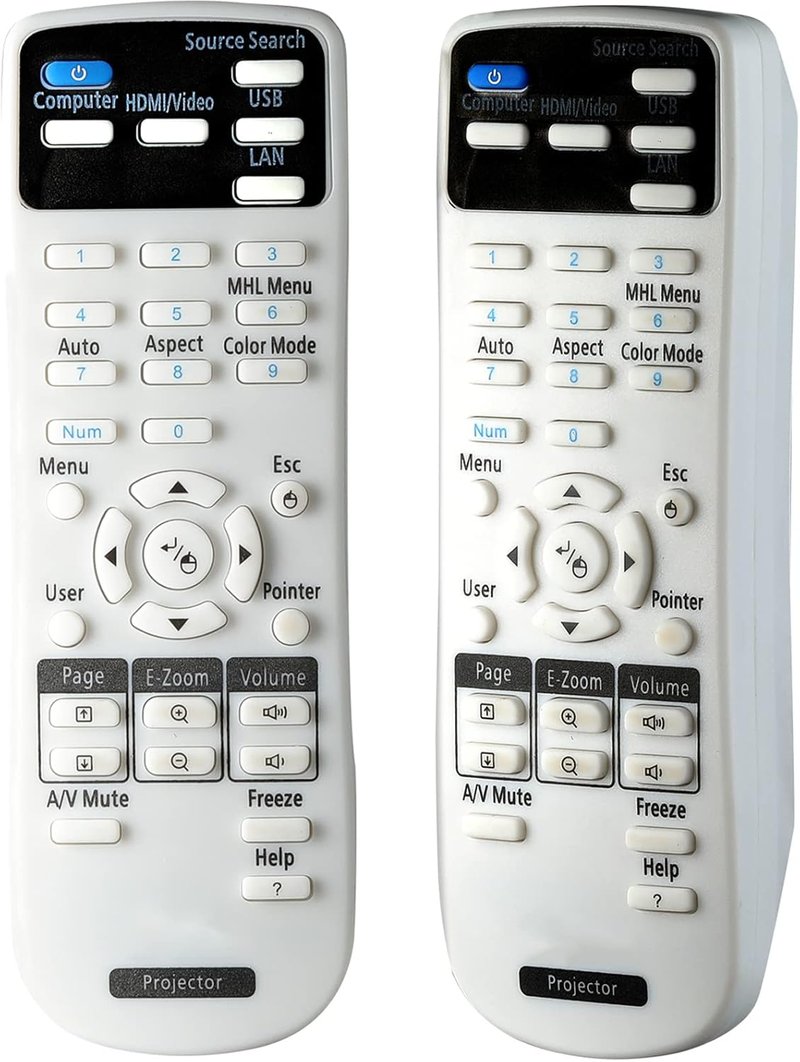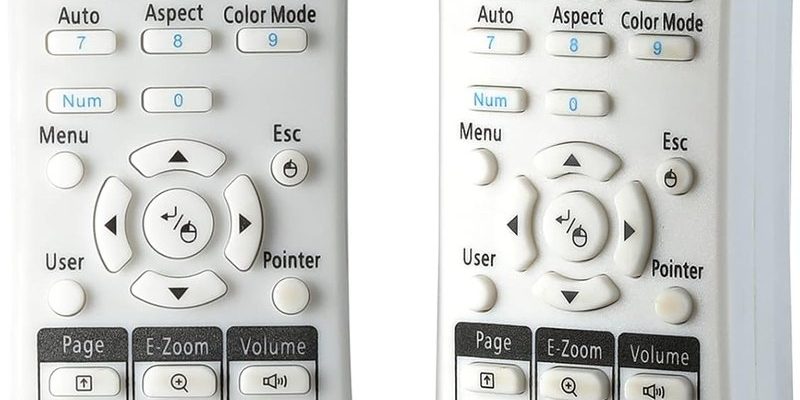
Let me paint the picture: You’re about to start movie night. The popcorn is just about perfect. But now, you’re stuck with two remotes—one for the Epson projector and one for your Roku TV. It’s not just a first-world hassle; it’s the kind of thing that makes you wonder, “Can’t there be a way to consolidate?” Let’s figure out *exactly* how much overlap there is between an Epson projector remote and a Roku TV, and whether you can toss one of those remotes aside for good. Spoiler: it’s a bit more complicated than you’d hope, but there are some workarounds.
How Do Epson Projector Remotes Actually Work?
First, picture your Epson projector remote. It’s not just a plastic wand; it’s a mini command center that talks to your projector using infrared (IR) signals. Think of IR like a super simple flashlight that blinks out coded messages only your projector understands. When you press “Power” or “Volume Up,” the remote sends a specific flash pattern.
Epson projector remotes are built to sync up and control only Epson projectors. There’s a *tiny* computer chip inside the projector and inside the remote—they share a secret language. Programming or resetting the remote typically just means popping in fresh batteries or, in rare cases, using a reset combo code if you’ve got a fancier, programmable one. No Bluetooth, no apps—just good old-fashioned IR.
The upshot? If your Roku TV doesn’t “speak” the same IR language as your Epson projector, a direct connection is unlikely. Each brand, and sometimes each device line, keeps its secret handshake pretty exclusive.
What Makes Roku TVs and Their Remotes Special?
Now, those Roku TV remotes—totally different animal. Most Roku TVs use *their own* set of IR codes for classic functions like power and volume. But here’s where things get a bit wild: many Roku devices (especially the streaming sticks and newer TVs) use Wi-Fi Direct or Bluetooth to connect their remotes. So, instead of light flashes, it’s more like a tiny walkie-talkie using invisible radio waves.
Some Roku TVs support both standard IR and wireless pairing, but the IR “code” set is unique to Roku. That means, even though you *could* technically pair a universal remote that supports Roku, a straight-up Epson projector remote isn’t going to magically translate those signals.
If you’re wondering why remote control manufacturers can’t just agree on one system, welcome to the club. There’s no “universal remote peace treaty”—each brand wants control (pun intended) over their own remote world.
Can You Directly Use an Epson Projector Remote on a Roku TV?
Here’s the most straightforward answer: **No, you can’t directly use an Epson projector remote with a Roku TV.** The two remotes are built for entirely different “languages” and circuits. If you try, nothing will happen—your Roku TV will just sit there, completely unimpressed by all your button-mashing.
Think of it like trying to use the key to your bike lock to open your front door. Both are keys. Both turn in locks. But unless you have some magical, one-of-a-kind house, those keys won’t ever swap roles.
Even if your Roku TV has an IR sensor—and some models do—the codes the Epson remote sends aren’t on the right “channel,” so the TV ignores them. There’s no way to sync or pair your Epson remote with the Roku TV, no matter how hard you hope.
What About Universal Remotes—Could They Be the Middleman?
Now, we’re getting into the workaround territory. If you want *one* remote to rule them all, you might be eyeing a universal remote. These are designed to “learn” or be programmed to a massive library of IR codes—think of them as multilingual translators for home electronics.
Here’s the catch: Universal remotes need to have both Roku TV and Epson projector codes stored in their database. Some high-end universal remotes (like certain Logitech Harmony models) support both. You’d just look up your device models, punch in a setup code, and voilà—the remote learns how to control both.
But let me be clear: You’re not using your Epson remote to control the Roku TV. *You’re using a fancy third-party remote instead.* The Epson remote itself is still just for the Epson; it can’t be “reprogrammed” to operate a Roku. Universal remotes are the peace negotiators—your Epson remote and Roku TV stay on opposite sides of the table.
Pairing, Syncing, and Troubleshooting: What to Expect
You might be wondering how much pairing or syncing is really possible with these remotes. For Epson projector remotes, there’s almost no “pairing” involved—just point, shoot, and hope there are fresh batteries. If something stops working, try replacing the batteries, resetting the remote (look for a tiny button or a specific key combo in the manual), or rechecking line of sight. If the remote is IR, anything blocking the path—like a pizza box or a wayward cat—can mess things up.
Roku TV remotes are a different story. The IR-only versions work the same way (line of sight and fresh batteries), but the Wi-Fi or Bluetooth ones often need to be paired. You usually do this by holding down the pairing button (sometimes hidden in the battery compartment) and following the on-screen instructions. If your Roku TV remote stops connecting, a quick reset or re-pairing often does the trick—Google is full of guides if you get stuck.
The bottom line? Don’t expect your Epson projector remote to sync or pair with your Roku TV. If you’ve got remote issues, focus on troubleshooting each device separately rather than looking for a magic cross-over solution.
Battery Life, Build Quality, and User Experience
It might sound silly, but not all remotes are created equal—especially when it comes to *battery life* and *how they actually feel in your hand*. Epson projector remotes usually last a good while on a pair of AAAs, since they only send IR commands and don’t have a lot of fancy extra features. They’re mostly plastic, lightweight, and survive the occasional couch-cushion tumble.
Roku TV remotes can be battery hogs, especially the ones with voice search or headphone jacks. The wireless ones draw more power, so don’t be surprised if you’re swapping batteries more often than with your Epson. Both remotes, though, are fairly straightforward to use—a few big buttons, clear labels, and not much in the way of deep menus.
User experience? I’m team “keep it simple.” Juggling two remotes isn’t the end of the world, but if you’re looking to reduce clutter or just want a smoother setup, this is where a quality universal remote can really shine.
Comparing Remote Alternatives: Is There a Better Way?
Let’s say you’re tired of playing remote roulette and want a smarter solution. You’ve got a few choices:
- Universal Remotes: Like we talked about earlier, they can be the bridge. Look for models that clearly list support for both Roku TVs and Epson projectors. Double-check the device compatibility list—some cheaper ones skip Roku entirely.
- Smartphone Apps: Some Roku TVs and projectors can be controlled with mobile apps. The Roku app is pretty slick—you can navigate menus, search with your phone keyboard, or even use voice commands. Epson has its own iProjection app for some models, but don’t expect it to control your Roku TV. You’ll be hopping between apps, so it’s not total remote harmony, but it’s closer.
- Voice Assistants: If your setup supports Alexa or Google Home, you might be able to control your Roku TV (and, less commonly, your Epson projector) by yelling instructions at your smart speaker. It’s… hit or miss, but for basic stuff like power and volume, it can be handy.
No single remote or app is perfect, but you can mix and match till you find a system that makes sense for your own movie nights.
Why Compatibility Still Matters (and What to Expect in the Future)
Here’s the thing: With every new device we buy, compatibility becomes a bigger deal. If you’re building a home theater or just adding new tech, not being able to consolidate controls might nudge you toward certain brands or make you choose between “cool features” and “remote sanity.”
Tech is slowly moving toward more open standards, with HDMI-CEC (the “Control Everything Over HDMI” feature) being one attempt. But it’s not perfect — and Epson projector remotes, sadly, aren’t part of the club that can control your Roku TV through HDMI-CEC.
What’s the dream? One remote, one interface, everything just works. Are we there yet? Not really. But at least with universal remotes, voice integration, and a bit of patience, you can get most of the way.
In my own living room, I keep a small basket of remotes—Epson, Roku, and a universal. It’s not pretty, but it works. And hey, at least I always know where the batteries are.
Final Thoughts: Living With Multiple Remotes (For Now)
So, circling back to the big question: **Are Epson projector remotes compatible with Roku TVs?** Unfortunately, they’re not. Each device sticks to its own set of codes, meaning you’ll need to keep both remotes handy, or invest in a universal option if you crave simplicity. While it’s not the streamlined, futuristic answer most of us want, it’s the reality for now.
It’s easy to get frustrated with all the little plastic remotes scattered around, but with a basic understanding of how they send commands (IR, Bluetooth, Wi-Fi Direct), at least you know why the crossover isn’t happening. If you’re gear-happy—upgrading your home theater every year or two—you might find shifting to a universal remote or app-based setup gives you back some control (and possibly a little bit of peace).
No magic wand yet, but with just a little know-how, you’ll be in command of your tech—one remote at a time.
